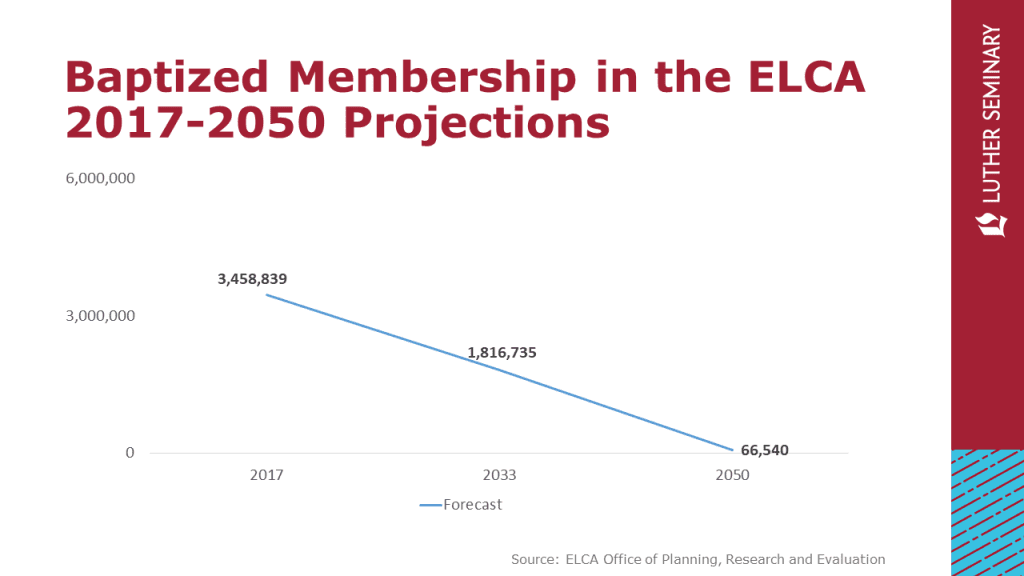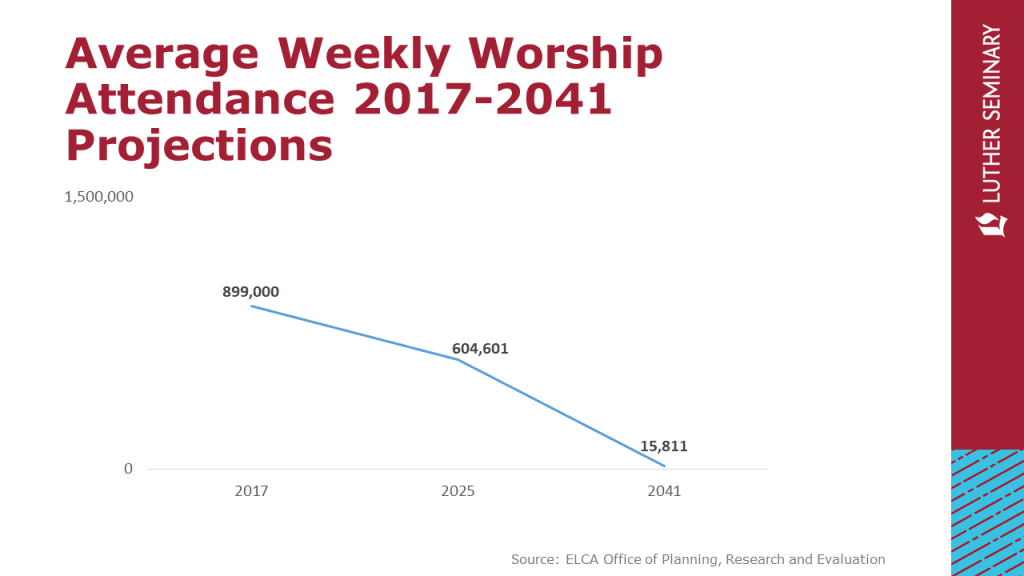According to projections from the Evangelical Lutheran Church in America’s (ELCA) Office of Research and Evaluation, the whole denomination will have fewer than 67,000 members in 2050, with fewer than 16,000 in worship on an average Sunday by 2041.
That’s right: according to current trends, the church will basically cease to exist within the next generation.


In some ways, this is old news. Mainline decline has been a reality for over half a century, and the trends are well established. Yet consider how rapidly this future is arriving—well within most of our lifetimes. The ELCA had over five million members when it was launched in 1988. It has only declined since, and the decline has been accelerating.
For all the energy spent on trying to turn things around over the past 40 years, there is little to show. That is because the cultural shifts underpinning this decline are largely beyond our control. To the extent to which we’ve tried to fix the Lutheran church, we’ve failed. I know a lot of really smart, faithful leaders who have poured their lives into this effort. It’s not their fault. The forces dismantling the established congregational and denominational system are much bigger. Something deeper is at stake.
My colleague Michael Binder and I have three ways of naming the root cause:
1) We live in a culture that makes it hard for people to imagine and be led by God.
In the modern West God isn’t necessary to live a good life. Divine presence and agency seem implausible for many people, even as we are haunted by echoes of transcendence. We’re all supposed to discover our own meaning, purpose, identity, and community. Faith might help with that for some people, but it’s assumed to be optional, and there are endless options before us.
2) We aren’t clear about what’s distinctive about being Christian.
For a long time, the church has been out of practice at telling a story to its own members and to its neighbors that sets it apart from other organizations. If the point of church is being a social, cultural, or community service organization, people have a lot of other ways of meeting those needs that are far more accessible. It isn’t clear in many local churches what the church’s theological identity or core story really is and how its practices make a distinct difference in people’s lives.
3) For these reasons, church isn’t helping many people make meaning of their lives.
A recent study from the Pew Research Center shows that spirituality and faith fall fourth in the list of sources of meaning for Americans, after family (69%), career (34%), and money (23%). People are turning elsewhere to find meaning, purpose, identity, and community. Faith might be a helpful thing for some to have, but it isn’t the center of life for very many.
So what can we do about this?
The institutional shape of the Lutheran and other mainline witnesses in the U.S. in the future will undoubtedly look quite different than today. Amidst the disintegration and decline, the church has an opportunity to rediscover its identity. Here are some steps to take:
1) Go back to basics.
Too many churches are cluttered with all sorts of programs and activities that aren’t really designed to form Christian identity and practice. Many of these are holdovers from previous eras. They may be meaningful to legacy members but not transferable to newer generations or diverse neighbors. We need to rediscover and reclaim the simple practices that Christians have always done–prayer, scripture study, service, reconciliation, Sabbath, hospitality, etc.–and make these the center of congregational life. Such disciplines must be expressed in forms ordinary members can practice in daily life throughout the week as they discern and join God’s leading in their neighborhoods and spheres of influence.
2) Shift from performative to participatory spirituality.
Faith cannot be primarily something performed by clergy or staff for people to watch or consume; it must be something that everyone is equipped to practice in daily life. This means creating pathways for simple, accessible spiritual habits and disciplines that can be adopted by everyone.
3) Listen.
The church needs to learn how to listen to its own members’ spiritual stories and experiences in order to help connect them with the stories of scripture and the theological tradition. This begins with finding out what keeps people up at night and helping them discover how the Gospel of Jesus makes meaning out of their experience, particularly their suffering.
4) Translate.
Most mainline churches’ language and cultural forms are inaccessible to most people in their neighborhoods. The Reformation involved a lot of vernacular translation. Somehow that got lost along the way. We need to reclaim it.
5) Experiment.
Everything listed above involves innovation, which is simply the adoption of new practices in a community. We don’t know what will work ahead of time. There is so much that needs to be discovered at the grassroots through local experimentation. We need to try a lot of things, learn from failure, and create an environment in which we can take risks together for the sake of the Gospel.
6) Share.
We need to take this journey together, not in isolation. Too many church leaders are lonely today. Most of our inherited church structures aren’t designed for peer sharing and mutual support. We need to figure out how to learn and discern together.
Claiming the promise
The dismantling of the inherited congregational and denominational structures may be the work of the Holy Spirit, the work of the devil, or just the byproduct of the end of the Age of Mobilization (when Americans organized themselves into voluntary societies to get things done) and the rise of the Age of Authenticity (when Americans looked inward to discover and express their true self). Trying to reverse it is pointless. It is better to get clear on what God’s promises in Christ are for us and for our neighbors and find simple ways to make those promises come alive for ordinary people in ways they can understand and embody.
Image credit: Photo by Andrew Seaman on Unsplash




What to do? Pray to our Father, listen to the Spirit and follow Jesus. The fact that this wasn’t listed as the #1 solution to “what we can do about it” says a lot. This article seems to think we are leaders, not followers. If the ELCA isn’t Christ’s church under His direction and leadership, what is it? It’s no wonder we’ve lost our way.
The link to the spiritual habits page seems to be broken. https://faithlead.org/its-the-little-things-the-power-of-habit/
Thanks for pointing that out, Boyd. The link must have gotten broken somewhere along the way. Should be fixed now: https://faithlead.org/blog/its-the-little-things-the-power-of-habit/ Blessings from the Faith+Lead team.
The author is completely wrong about the reasons for decline in ELCA membership. The church is in decline because it has gone woke and turned away from the truth. And the biggest issue isn’t that the majority of members will leave the church for other Christian denominations – although some certainly will – it’s because the members will fall away completely into the anti-Christian dogma of leftism and wokeness. Once the church embraced cultural Marxism, membership will have their thirst quenched by real Marxism and they will shed association with this organized religion, in favor for the organized religion of Marxism. If you offer people weak tea, eventually they will leave in search for stronger tea. The attempts to embrace woke cultural trends with the hope that it will appeal to people and keep them in the fold is folly. It turns off people who want nothing to do with woke ideas and it turns off woke people who conclude they can find more satisfaction outside the ELCA altogether.
Spot on. This is all on the ELCA. Blaming societal problems keeps them from looking within and admitting they’re messing it up.
EXACTLY!!! Social justice is their new target, the Bible is secondary. They aim to push their indoctrination on kids more than anything.
Very interesting article that I just fell onto as I was searching for something else. Post COVID has been a real challenge. Many of the thoughts expressed in this article are “food for thought”. It may be a platform for congregational discussion and innovation in meeting both the needs of members and the surrounding community. Thank you.
The ELCA has put too much emphasis on beer-drinking @ church events in recent years. Apparently it prefers beer consumption to assisting its members in dealing with alcohol issues.
I was looking for articles on reasons to stay with the ELCA. They have been a huge disappointment to me and this article failed. I didn’t stop going for any of those reasons. I left because of their positions on abortion and trans rights primarily and don’t give me this crap about its more important to love them over what Biblical scripture says. The ELCA has lost its way. Just look at Nadia Weber Boltz as an example. Her mouth alone needs washed out. For me is it worth staying and fighting against the sin that has infiltrated this church? I am beginning to think not. A close friend keeps telling me the church is going to move from behind 4 walls. I think she is right.
I was baptised and confirmed LCA Lutheran. The church merged to ELCA and this is the way that I say to people who ask me. ELCA has gone the way of the culture. I have attended 2 different ELCA churches (one winter, one summer locations). Both have folded to the cultural norms. The decay started with the congregations taking a look at the “homosexual” lifestyles. If I recall correctly this was to have discussions. Next step (as always) was to approve of homosexual pastors! That should have been a NO GO as GOD NEVER CHANGES. He is the same today, tomorrow and yesterday. When the new pastor sent out an email with a HE/HIM at the bottom, I was wondering what in the world this was about… some sort of major typo? Again, this display of adapting to cultural norms is outrageous. I just didn’t realize what I was looking at. When I did finally pay attention is during the supposed pandemic. WHY ARE PEOPLE OF GOD LIVING LIKE COWARDS? WHY ARE THEY PRAISING NEWER AND QUICKLY FORMED ANTIDOTES (labeled vaccines) and praising GOD for them? That was a mind blower for me. Then, comes the lectures/sermons on social justice… YEAH… Thanks.. Had enough.
I know that GOD was leading me to my eventual (5 yr hard long decision) to leave a church that I had been a member of for 60 years! This was a very hard decision and it wasn’t easy. However, I have found a Missiouri Synod Lutheran Church which aligns with what I was taught in Sunday School some 50 years ago.. GOD NEVER CHANGES.. He is the same today, tomorrow as he was yesterday and so what I learned (thankfully) as a child has stayed with me. GOD will provide and he has. I now attend church with a GLAD HEART rather than being SO SO mad and disgusted after every service at the ELCA. I’m sad to think that one day my sweet church will close it doors, but, if they don’t wake up. That will be and should be their destiny.